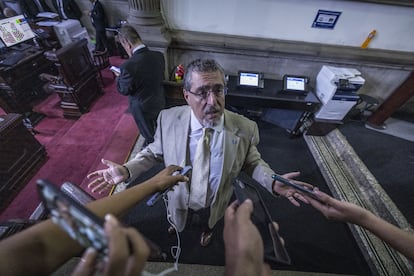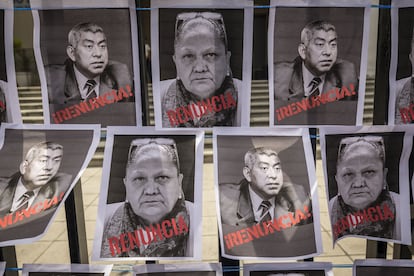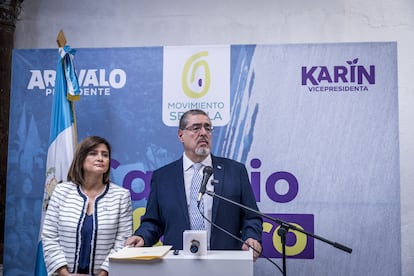Bernardo Arévalo’s fight to take office as Guatemala’s president
The president-elect has denounced an attempt to block him from being sworn in on January 14, calling it a coup’

Bernardo Arévalo de León’s stunning victory in the August 20 presidential elections has thoroughly shaken Guatemala’s entrenched elites. The sociologist, diplomat, and progressive legislator campaigned on a firm message against corruption and impunity, vowing to halt the diversion of public funds to elites who have unlawfully enriched themselves, exacerbating the country’s social inequalities.
His win unsurprisingly triggered a response from Guatemala’s powerbrokers, who revealed their firm grip on law enforcement, the judicial system, and the Congress of the Republic. They launched a thinly veiled effort to block Arévalo from becoming president and addressing the deep-rooted corruption in the Guatemalan government. On September 1, Arévalo publicly denounced a “coup d’état” attempt to prevent him from taking office in January. He specifically named Attorney General Consuelo Porras as the main instigator and called for unity to defeat those involved in the coup.
To take office on January 14 as planned, Arévalo will need the backing of economic, social, academic, professional, and indigenous elites. Experts consulted by EL PAÍS suggest that these groups will need to do a through soul-searching and reassess their positions on the dismantling of corruption networks.
According to Úrsula Roldán, the director of the Research Institute of Socio-Humanistic Sciences (ICESH) at Rafael Landívar University, for Arévalo to take office amid such powerful opposition would be a commendable achievement. To establish a robust government, says Roldán, the elites must choose between supporting democracy or enriching themselves by manipulating public institutions.

Concerns about attempts on Arévalo’s life
After unexpectedly advancing to the second round of voting, Arévalo and his Seed Movement (Movimento Semilla) party clearly saw that they were making Guatemala’s elites very uncomfortable. Rafael Curruchiche, the current chief of the Justice Ministry’s Office of the Special Prosecutor Against Impunity (FECI), promptly launched an investigation against Arévalo’s party for alleged signature falsification in the political party registration process. Despite vehement denials by its leaders, the party was temporarily suspended until the Supreme Electoral Tribunal (TSE) reversed the decision on September 3. Many citizens see Curruchiche’s move as a response from corrupt elites, given his failure to provide evidence supporting the allegations and the timing of the suspension. “They want to kill Arévalo and the party to stop it from growing,” said attorney Mariana Rohrmoser, from the Citizens Against Corruption group.
The president-elect, however, is not only facing a judicial onslaught. During their August 20 election-night celebrations Arévalo and his running mate, Karin Herrera Aguilar, they were alerted about a planned attack on their lives. The Inter-American Commission on Human Rights (IACHR) quickly granted them precautionary protection.
Following Arévalo’s victory, there was a surge in legal maneuvers aimed at undermining the legitimacy of a party committed to combating the public corruption that drains approximately 30% of the government budget. “We must return to democratic institutions and rebuild a system that was hijacked by the corrupt political class,” he said in an interview with EL PAÍS before the second round of voting.
However, the road ahead won’t be easy. Since winning the elections, his party has faced physical and judicial threats. Looking ahead to January 14, the most extreme scenarios discussed in the media include the potential annulment of the elections or a provisional president appointed by the new Congress. These measures may seem dire, but many court decisions have pushed Guatemala to the edge of what some analysts call a “technical coup d’état.”
In order for Arévalo to take power, “It’s crucial to protect his life, as well as the lives of his colleagues,” said Úrsula Roldán from ICESH. “It’s also important to prevent the suspension of the [Seed Movement] party, which is under threat by people in the Justice Ministry and Judicial Branch who have perverted their roles.”

In late August, Congressional leaders (supporters of current President Alejandro Giammattei) , disenfranchised the Seed Movement legislators, saying they were now independent representatives after the party was temporarily suspended. However, the TSE said the suspension could not stand because it did not come from an electoral entity. Its decision holds until the official end of the electoral period on October 31.
Congressman Mario Taracena, who has 40 years of political and legislative experience, believes that the inexperience of the Seed Movement legislators is being exploited by the ruling party and its allies to pressure the president-elect into negotiations. “They’re trying to soften Bernardo up so he understands that he has to deal with Congress,” Taracena told the ConCriterio news outlet.
An alliance with the Guatemalan people
Taracena’s advice to the president-elect is to avoid forming alliances with Congress, and warns that giving in to their demands will quickly lead to extortion. Taracena has exposed several cases of bribery for approval of certain laws and budget allocations, and believes Arévalo’s only reliable alliance is with the Guatemalan people. Social media campaigns, public protests and widespread petitions are springing up in support of Arévalo. A non-binding petition with over 100,000 digital signatures demanded the resignation of Consuelo Porras, the attorney general who is accused of persecuting Guatemala’s anti-corruption champions.
In the international community, the Organization of American States and the European Union have expressed concerns about suppressing the popular will and stress the need for a peaceful transition process. In a special session, the OAS Permanent Council voiced concern about the Justice Ministry’s intimidation of electoral officials, volunteers and elected officials. The OAS ambassadors were unanimous in their defense of democracy and said, “The legislative, executive, and judicial institutions must respect and ensure the civil and political rights protected by the American Convention on Human Rights, in order to prevent any interference in the presidential transition process.”

The National Business Council (CNE) was one of the first groups to call for Consuelo Porras to step down. “A healthy economy cannot be established when the government entity responsible for taking legal action is actively undermining the voice of the people expressed in the election,” said the Council’s statement released on August 29.
CNE President Rodrigo Salguero pointed to the economic and international impacts caused by the attorney general’s actions. “Imagine how the stock markets and investment funds see us,” said Salguero, anticipating an economic downturn if democracy backslides in Guatemala. “If a judge and a prosecutor contrive a case to strip a party of its legal status, they may use the same tactics against my company in the future.”
The duty of the elites
The traditional business elite, represented by the Coordinating Committee of Agricultural, Commercial, Industrial and Financial Associations (CACIF), has refrained from taking a position on the attempts to delegitimize the Seed Movement. In an interview with the Prensa Libre newspaper, CACIF President Ignacio Lejárraga faintly mentioned the need for a governance consensus during the transition period, but failed to offer any ways of achieving this consensus.
Úrsula Roldán believes the country’s elites will be very reluctant to change their ways. “I think they are still waiting for a negotiation that enables them to keep a good part of what they have, and will ignore the international community’s demand for a political modernization that requires them to sacrifice their economic interests for the good of the country.”
CACIF representatives are actively involved in the advisory councils of more than 50 public institutions. Until the 2019 elections, CACIF heavily contributed to political parties aligned with their business interests. To address the citizens’ demands regarding corruption, Roldán believes that every sector – academia, indigenous peoples, civil society organizations, unions and professional associations – must come together to discuss solutions.
Mariana Rohrmoser agrees and says everyone – individuals, groups and leaders – must unite before January. Her Citizens Against Corruption organization has been actively promoting anti-corruption education among youth and communities for five years, among other initiatives. “We have to unite and demand that the inauguration goes forward,” said Rohrmoser. Living in a country co-opted by corrupt elites is “draining and devastating,” she said. “Our community lacks public transportation and access to basic services, which are priorities that the new government should address.”
Rodrigo Salguero says the first sign of real change that Arévalo can provide is the announcement of a competent and skilled cabinet. Arévalo says the appointment process is 60% complete, but has closely guarded the details. Ultimately, these are the people who will stand on the front lines in the battle against corruption.
Sign up for our weekly newsletter to get more English-language news coverage from EL PAÍS USA Edition
Tu suscripción se está usando en otro dispositivo
¿Quieres añadir otro usuario a tu suscripción?
Si continúas leyendo en este dispositivo, no se podrá leer en el otro.
FlechaTu suscripción se está usando en otro dispositivo y solo puedes acceder a EL PAÍS desde un dispositivo a la vez.
Si quieres compartir tu cuenta, cambia tu suscripción a la modalidad Premium, así podrás añadir otro usuario. Cada uno accederá con su propia cuenta de email, lo que os permitirá personalizar vuestra experiencia en EL PAÍS.
¿Tienes una suscripción de empresa? Accede aquí para contratar más cuentas.
En el caso de no saber quién está usando tu cuenta, te recomendamos cambiar tu contraseña aquí.
Si decides continuar compartiendo tu cuenta, este mensaje se mostrará en tu dispositivo y en el de la otra persona que está usando tu cuenta de forma indefinida, afectando a tu experiencia de lectura. Puedes consultar aquí los términos y condiciones de la suscripción digital.








































